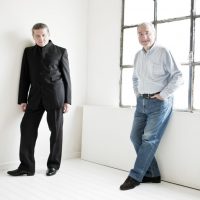Two worlds face to face: the exactness of classical music versus the improvisational freedom of jazz. This is the guantlet Ermanno Basso, music producer at CAM JAZZ, has thrown down to pianist Michele Campanella and saxophonist Javier Girotto. Campanella chose some tunes from Maurice Ravel’s and Claude Debussy’s repertoires, and, together with Girotto, sought common ground where they could meet and express themselves, hereby preserving their own distinctive features. It is neither classical music that is lured by the free form of jazz, nor jazz that makes an attempt at the sober elegance of classical music. This is where the originality of this CD lies: no compromise, no attempt to create a questionable hybrid, just a dialogue of two different, apparently compatible voices. This is what “Musique Sans Frontières” is about. Both the opening and the closing tracks are by Ravel: “Pavane pour une infante défunte” conveys suspended atmospheres that portray the little girl in the title through music. Three of the five songs originally composed for “Miroirs” (“La Vallée des Cloches”, “Oiseaux tristes” and “Alborada del gracioso”) come at the end of the set, narrating and retracing the first similarities between classical compositions and early jazz. Three superb tunes by Debussy are performed in the middle: “Suite Bergamasque”, “Rêverie” and the “Children’s Corner” suite. The whole selection allows Campanella and Girotto to explore the thin border line between jazz and some expressions of the classical music from early 20th century, when the two genres grew and evolved simultaneously, watching and weighing up each other inquisitively. This inquisitiveness also allowed the two musicians, who achieved their professional growth through different paths, to try out a new language, “sans frontières”: willing to look for new expressive nuances, able to combine them in a blend of modern and traditional, they found a different, extremely intriguing course. This is a record worthy of discovery and careful listening.
° ° °
Due mondi a confronto. Il rigore della musica classica e la libertà improvvisativa del jazz. Una sfida lanciata da Ermanno Basso, produttore artistico di CAM JAZZ, al pianista Michele Campanella e al sassofonista Javier Girotto. Campanella ha scelto alcuni brani del repertorio di Maurice Ravel e Claude Debussy, cercando insieme a Girotto degli spazi in cui trovare un territorio comune su cui incontrarsi e in cui esprimersi insieme, senza rinunciare alle proprie peculiarità. Non è la musica classica che si fa tentare dalla forma libera del jazz, né il jazz che va a insidiare la sobria eleganza della musica classica. La novità sta proprio qui: non c’è compromesso, non c’è il tentativo di creare un discutibile ibrido, bensì semplicemente un dialogo tra due voci diverse ed evidentemente compatibili. Questo dimostra “Musique Sans Frontières”. Il programma si apre e si chiude con Ravel: la “Pavane pour une infante défunte” regala atmosfere sospese che dipingono in musica la bambina evocata dal titolo; tre dei cinque brani originariamente composti per “Miroirs” (“La Vallée des Cloches”, “Oiseaux tristes” e “Alborada del gracioso”) chiudono l’opera, raccontando e ripercorrendo la nascita delle prime affinità tra le composizioni classiche e il jazz degli esordi. Nel mezzo, tre magnifiche opere di Debussy: la “Suite Bergamasque”, “Rêverie” e la suite “Children’s Corner”. Tutte scelte che permettono a Campanella e Girotto di esplorare quella sottile linea di confine tra il jazz e alcune espressioni della musica classica dei primi del Novecento: un periodo in cui i due generi crescevano e si evolvevano parallelamente, osservandosi e studiandosi con reciproca curiosità. La stessa curiosità che ha permesso a due musicisti, che sono cresciuti facendo percorsi diversi, di sperimentare un linguaggio nuovo, “sans frontières”: animati dalla voglia di trovare nuove sfumature espressive, capaci di unirli in una fusione di modernità e tradizione, hanno trovato una strada nuova ed estremamente interessante. Un disco da scoprire e ascoltare con grande attenzione.






